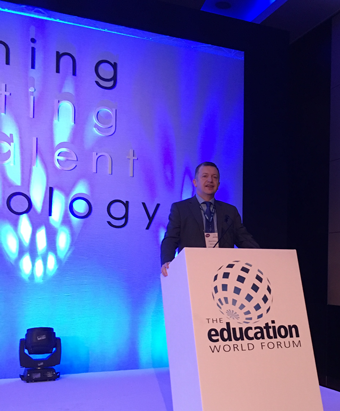A big week for international education in London, where the Education World Forum (EWF) took place. This is an annual meeting attended by ministers and senior educationalists from around the world, normally held in the same week as Bett, the education technology show. The theme for this year's forum was education policy making for teaching, testing, talent, and technology, a bit of an omnibus theme but a good opportunity to reflect on the multiple ways in which technology is changing and will continue to change education - and as such, an excellent prequel to the Bett show, with its very practical emphasis on particular platforms and applications, some of which have yet to make a transition from catalogue to classroom.
 Michael O'Sullivan appeared in a keynote session (pictured left) on the use of assessment to generate performance and attainment data, and emphasised the important point, often lost when celebrating the power of technology, that the quality of data generated through the use of both formative and summative assessment is very dependent on the quality of the questions being asked. Michael outlined some of the key issues to do with making sure that questions are clearly and unambiguously phrased, that the allocation of marks to components within questions is appropriate to the level of challenge, and that overly complex questions don’t impede the process of getting an accurate picture of what a student has learnt.
Michael O'Sullivan appeared in a keynote session (pictured left) on the use of assessment to generate performance and attainment data, and emphasised the important point, often lost when celebrating the power of technology, that the quality of data generated through the use of both formative and summative assessment is very dependent on the quality of the questions being asked. Michael outlined some of the key issues to do with making sure that questions are clearly and unambiguously phrased, that the allocation of marks to components within questions is appropriate to the level of challenge, and that overly complex questions don’t impede the process of getting an accurate picture of what a student has learnt.
Michael shared the platform with ministers of education from both Uganda and Egypt, the latter of whom emphasised the interesting paradox, in the context of the very high stakes Egyptian university entrance exam, that student pressures on teachers for high summative scores can undermine the effective use of formative assessment in the classroom. Also on the platform was Dr Rukmini Banerjee, the CEO of Pratham, India. Pratham was set up in 1995 to provide education to children in the slums of Mumbai, and has done pioneering work in developing a learn to read program that emphasises the importance of eradicating illiteracy as a step in the elimination of poverty. They also pioneered the Annual Status of Education report (ASER) that covers over 16,000 households and 600,000 children each year in the largest non-governmental household survey in rural India, providing an inventory of educational needs and achievement. This is a very good example of the use of assessment to provide data that can then be used as a basis for practical improvement programmes, and a refreshingly positive contrast to the problems of hyper accountability that are so often associated with the use of assessment in the UK and many other developed economies.

In another session, the Ukrainian minister talked a bit about the development of the new Ukrainian curriculum. This is based around developing ten key life competencies including a sense of entrepreneurship, environmental awareness, mathematical and scientific literacy, and the ability to deploy technology. The idea is that young people leave school with the capacity to think critically, act ethically and operate innovatively. This does of course reflect the preoccupations of many educators around the world, but was given particular impetus in Ukraine by the very volatile political environment there, and the desire to establish a firmly western looking direction for their reformed education system. All of that was a great contrast to the magnificent and decidedly pre-tech surroundings of Lancaster House (pictured above), where the day finished with a reception for delegates and a speech from the Secretary of State, Justine Greening.
Simon Lebus
Group Chief Executive, Cambridge Assessment